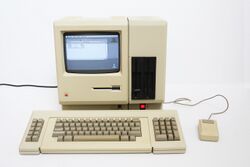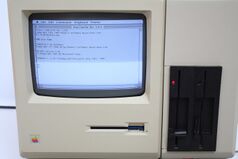Engineering:MacCharlie
 MacCharlie (right) running on a Macintosh 512K (left) | |
| Connects to | Macintosh 128K, Macintosh 512K |
|---|---|
| Manufacturer | Dayna Communications |
| Introduced | April 2, 1985 |
| Discontinued | 1986/1987 |
| Cost | US$1,795 (equivalent to $4,300 in 2019) |
| Type | Hardware emulation |
| Memory | 256–512 KB |
| Connection | DE-9 connector |
| Weight | 7 lbs (3.2 kg) |
| Dimensions | 13.8 by 14.7 by 10.8 inches (35 by 37 by 27 cm) |
The MacCharlie was a hardware add-on for the original Apple Macintosh (Macintosh 128K) that was made by Dayna Communications.[1] It allowed users to run DOS software for the IBM PC by clipping a unit onto the chassis of the Macintosh 128K, and included a keyboard extender to provide the function keys and numeric keypad that are absent from Apple's original keyboard. The name refers to an IBM PC advertising campaign of the time featuring Charlie Chaplin's "Little Tramp" character.[2]
The clip-on unit sits to the side of the Mac and, like the contemporary Amiga Sidecar, contains essentially a complete IBM PC compatible with an 8088 processor, 256 KB of RAM (expandable to 640 KB) and a single 5.25" floppy disk drive that stores 360 KB. A second floppy drive could be added.
While running DOS software using MacCharlie, users could still access the Macintosh menu bar and desk accessories. However, the DOS environment, which ran in a window, was text-only and did not permit Macintosh applications to run concurrently while in use.[3] MacCharlie used the Mac as a terminal, performing all DOS processing itself, and sent video data over a relatively slow serial link to the Mac for display.[2] This slowness, coupled with the declining prices of real IBM PC compatibles, contributed to the short market life of the MacCharlie.[citation needed]
See also
References
- ↑ Knight, Dan. "Dayna MacCharlie". http://lowendmac.com/1985/dayna-maccharlie/.
- ↑ 2.0 2.1 "Dayna MacCharlie". October 21, 2006. http://www.vintagemacworld.com/charlie.html.
- ↑ Stobie, Ian (November 1985). "Mac Charlie Imitating IBM". Practical Computing: 93. https://worldradiohistory.com/UK/Practical-Computing/80s/Practical-Computing-1985-11-S-OCR.pdf. Retrieved September 12, 2022.
External links
- 1985 Advertisement hosted by The Mac Mothership
- Personal Computers; linking Mac to the I.B.M. PC , 1985 review article at the New York Times
 |




